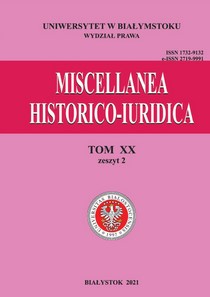Von der Konstitutionalisierung von Nulla poena, nullum crimen sine lege in Art. 116 WRV (1919) zu dessen Umkehrung in ein Nullum crimen sine poena durch das NS-Regime
From the Constitutionalization of the Principle of Legality nulla poene, nullum crimen sine lege Principle within the Weimar Constitution to its Reversal to a Principle of nullum crimen sine poena by the Nazi Regime
Author(s): Martin HegerSubject(s): History of Law, Constitutional Law, Government/Political systems, Interwar Period (1920 - 1939), Fascism, Nazism and WW II
Published by: Wydawnictwo Uniwersytetu w Białymstoku
Keywords: nulla poena sine lege; nullum crimen sine lege; RStGB; WRV; Reichstag Fire Ordinance; Reichsgericht; Reichstag Fire Trial;
Summary/Abstract: The principle of Legality (nullum crimen, nulla poena sine lege) is the most fundamental principle of German criminal code since it was codified in the Bavarian Criminal Code 1813 for the first time. With the Foundation of the German Empire in 1871 it became an integral part of the new German Penal Code (Reichsstrafgesetzbuch). It was constitutionalized in 1919 as a fundamental right with Art. 116 of the Weimar Constitution. It was unchallenged till the Nazi regime came to power. Not within the Empowerment Act but with other legal measures resulting from the burning of the Parliament (”Reichstagsbrand”) on 28 February 1933 till 1935 on, the Nazi regime changed the principle step by step from nullum crimen, nulla poena sine lege to nullum crimen sine poena. They made Analogy in disfavor of the accused person possible and they stated criminal offences with retroactivity. Unfortunately, the Supreme Court of Justice (Reichsgericht) accepted the new provisions and used it as a basis for its sentences. After WW II the allies nullified the Nazi provisions. With Art. 103 § 2 of the new (West-)German constitution from 1949 nulla poena sine lege has been constitutionalized again. The Paper deals with that development with a special focus on the role of the Reichsgericht as the highest body of judges, who were trained in the times before the Nazis came to power.
Journal: Miscellanea Historico-Iuridica
- Issue Year: 20/2021
- Issue No: 2
- Page Range: 9-20
- Page Count: 12
- Language: German

